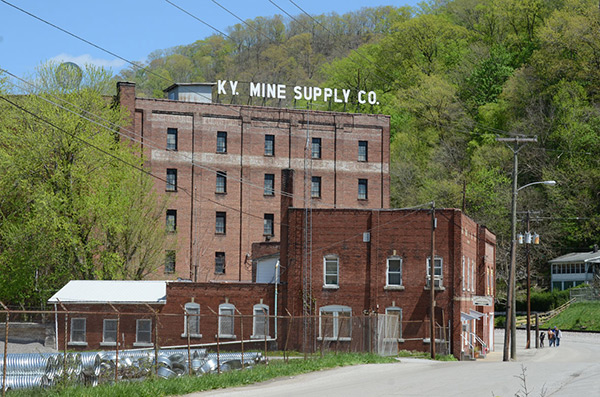BOONE—“After Coal,” a feature-length film created through Appalachian State University’s Center for Appalachian Studies, premieres on two continents this spring.
The hour-long film was shown at New Jersey’s Princeton Environmental Film Festival and Ohio’s Athens International Film Festival in April. On May 27, it will premiere at Wales’ Hay Festival in Hay-on-Wye in the United Kingdom, featuring the music of two Appalachian alumni who assisted with the film’s production and soundtrack.
The film profiles inspiring individuals who are building a new future in the coalfields of central Appalachia and South Wales. The film is directed by Tom Hansell and co-produced by Hansell and Pat Beaver, who served as director of the Center for Appalachian Studies for 20 years.
The Welsh coalfields were shut down in the 1980s, eliminating more than 20,000 jobs. Meanwhile, the Appalachian coalfields lost over 20,000 mining jobs between 1994 and 2014. Both regions have survived disasters associated with mining production and waste disposal, and each has explored strategies for remembering the past while looking to the future.
“After Coal” is “an unforgettably beautiful story… that touches each of us in powerful ways,” according to William Ferris, author of “The Storied South: Voices of Writers and Artists.” Stephen L. Fisher, co-editor of “Transforming Places: Lessons from Appalachia,” said the film’s “historically grounded portrayal…offers important lessons on reinvention.”
The Center for Appalachian Studies has facilitated 30 years of exchange between coalfield regions in Appalachia and South Wales. In 1974, Appalachia scholar Helen Matthews Lewis spent two years in Wales researching coalfield communities. She and sociologist John Gaventa and filmmaker Richard Greatrex made more than 150 video tapes of daily life in South Wales as Welsh coalfields were beginning to shut down. “After Coal” combines these archival materials with recent interviews and footage by Hansell and Beaver for a depiction of the similar story lines between the coalfields in Wales and Appalachia.
The May 27 premiere in the United Kingdom will include a panel discussion with Hansell and others involved in the film’s production, including Appalachian alumni Rebecca Jones and Trevor McKenzie who will perform a concert of Appalachian music. They recorded the gospel song “Looking for the Stone” on fiddle, banjo and guitar versions for the documentary’s soundtrack.
Jones, who now works with filmmaker Ken Burns, assisted with research, videotaping and editing of “After Coal.” She earned a bachelor’s degree in communication in 2009, followed by a master’s degree in Appalachian studies in 2011. McKenzie is an archivist in the W.L. Eury Collection of Appalachian’s Belk Library and Information Commons who also assisted with research. He earned a history degree in 2010 and a master’s degree in Appalachian studies in 2012.
Current students participating in a study abroad course titled “Appalachia and Wales” led by the Department of History and Center for Appalachian Studies will also be present at the premiere.
About the film and its creators
“After Coal” is a project of the Center for Appalachian Studies at Appalachian State University. Fiscal sponsorship was provided by The Southern Appalachian Labor School and the Southern Documentary Fund. It was funded in part by the Chorus Foundation, the West Virginia Humanities Council and United States Artists.
Director and co-producer Tom Hansell’s documentary work has been broadcast nationally on public television and has screened at international film festivals. Hansell’s documentary “Coal Bucket Outlaw” was broadcast on public television in 30 states. His most recent documentary, “The Electricity Fairy,” screened at the Museum of Modern Art in New York in 2010 and was selected by the SouthArts for the Southern Circuit tour of independent filmmakers. “After Coal” is Hansell’s first international project.
Co-producer Pat Beaver directed the Center for Appalachian Studies at Appalachian for 20 years until her retirement in 2013. In that position, she coordinated the groundbreaking Appalachian Land Ownership Study in 1978, which found that absentee individuals and corporations owned 43 percent of land in an 80-county region within five states, hosted an exchange of Welsh miners in 1979, and started a Welsh study abroad program in 2001. This spring, she received the 2016 Western North Carolina Historical Association (WNCHA) award for outstanding achievement for making significant contributions in preserving and promoting the history of the Appalachian mountain region.
For more information, visit http://aftercoal.com.
About Appalachian State University
As a premier public institution, Appalachian State University prepares students to lead purposeful lives. App State is one of 17 campuses in the University of North Carolina System, with a national reputation for innovative teaching and opening access to a high-quality, cost-effective education. The university enrolls more than 21,000 students, has a low student-to-faculty ratio and offers more than 150 undergraduate and 80 graduate majors at its Boone and Hickory campuses and through App State Online. Learn more at https://www.appstate.edu.
Media Contact
Director Tom Hansell
[email protected]
828-406-4154
What do you think?
Share your feedback on this story.







![How NCInnovation Is Rethinking Economic Development in North Carolina [faculty featured]](/_images/_posts/2026/02/rethinking-economic-development-600x400.jpg)






